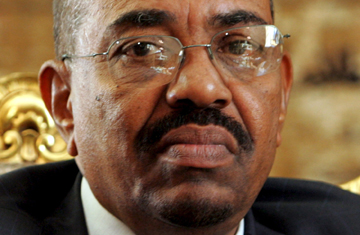
(3 of 5)
How many cases have been prosecuted?
I do not recall, but I do recall that we removed immunity from a member of the [National] Security. He was put to trial [for his] link to some events, and was found guilty and executed. There are a number of other examples that I do not recall at the moment, because they are trials carried out on the ground.
One of the effects of the ICC's arrest warrants is that you will be unable to travel to, say, the United Nations. How effectively can you represent the government?
Up to now, I have not felt [any] restrictions of movement. I am not a minister of foreign affairs where I am supposed to travel frequently to other countries, conferences and meetings. A president has his deputies, assistants and his specialized ministers, so it's not necessary for a president to travel to every country. But I have traveled all necessary travels.
After 20 years in power, and with presidential elections next year, did you ever consider not standing for president again?
The choice is that of the Sudanese people. That is a democratic choice, and we are absolutely committed to having elections next year. In fact, we are the party that insists the most on having these elections because this is a commitment to the Sudanese people. As I mentioned earlier, our honesty and clarity with our people is what has made us withstand for 20 years. We are ready to accept any result, and we call on anyone who wishes to observe these elections to come to Sudan and we will make it possible for them to move or be at any place they wish, and to get any information they want. Because these elections — we insist, God willing — will be free and fair, and we will have a large number of witnesses to it.
Through our own reading into and assessment of the popularity of the [ruling National Congress] Party and the government, we believe we will win these elections. We will not decide winning the elections, but we think we will win them, and we think that others [political parties] are aware of our popularity and wide popular base.
Let me give you an example of our popularity: In the universities there are free and fair elections for students to choose their union leaders. It is well known that students mostly oppose governments. We win almost all elections in the universities comfortably with no strong competition. This might be a sign of how strong our popular base is. We want the Sudanese people to be our judge.
The items currently on the table with relation to the U.S. are removing Sudan as a State Sponsor of Terror, restoring diplomatic relations, and perhaps the end of sanctions. What are the responsibilities of Sudan to achieve these?
We are convinced that all the accusations made against Sudan are baseless. American intelligence agencies, whether the CIA or FBI, confirm that Sudan does not host or support terrorism. After the events of September 11, many predicted that Sudan would be one of the U.S.'s targets. But the U.S. did not target Sudan because its own agencies confirmed that Sudan does not host or support terrorism.
Second, after September 11, the U.N. Security Council-sponsored sanctions against Sudan that were placed because of the attempt on the life of President [Hosni] Mubarak [of Egypt] in Addis Ababa were removed. U.S. special envoys that came to us — and I recall [John] Danforth and [Robert] Zoellick — Danforth came and had an appreciated role in helping reach a peace agreement in southern Sudan. He tied the removal of Sudan [from the State Sponsors of Terror list] and the removal of sanctions and the blockade against Sudan, and normalizing relations [with the U.S.], to the signing of the peace agreement. He did not mention terrorism or any other activities of Sudan that were needed to remove the sanctions. He said the only thing needed was to sign a peace agreement with the SPLA. But unfortunately, after we signed, there was no response.
Zoellick repeated this when he was [Deputy] Secretary of State, and mentioned that after signing the Darfur Peace Agreement in Abuja, that Sudan will be removed from the terrorism list, and sanctions will be removed and relations will be normalized. In both cases we were not asked to stop any hostile foreign activities that require these punishments. The only requirement was to sign the peace agreement and we did.
We think there are pressure groups in the United States that are stronger than the government's obligations. After we signed the peace agreement in Abuja, I received a telephone call from President Bush personally, and he spoke with great admiration and appreciation to what had been achieved in Abuja, and that the United Sates was now ready to interact with all openness with Sudan. But of course, he couldn't continue along this line.
